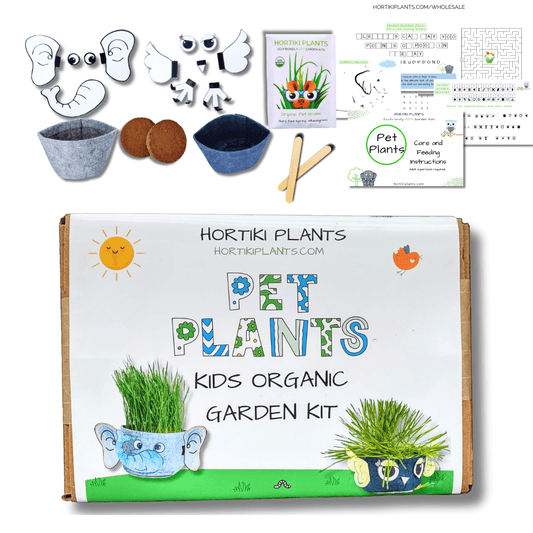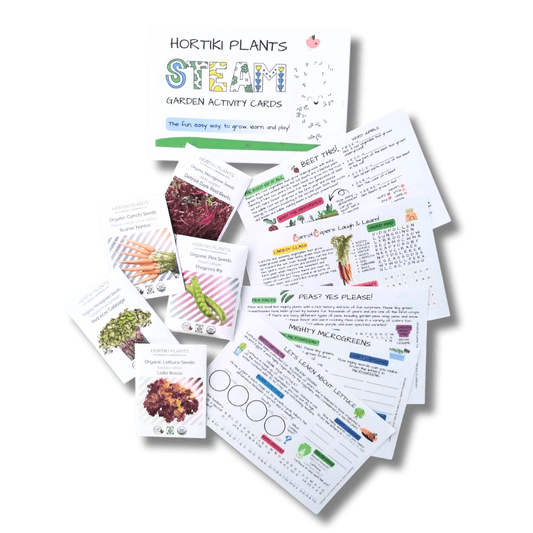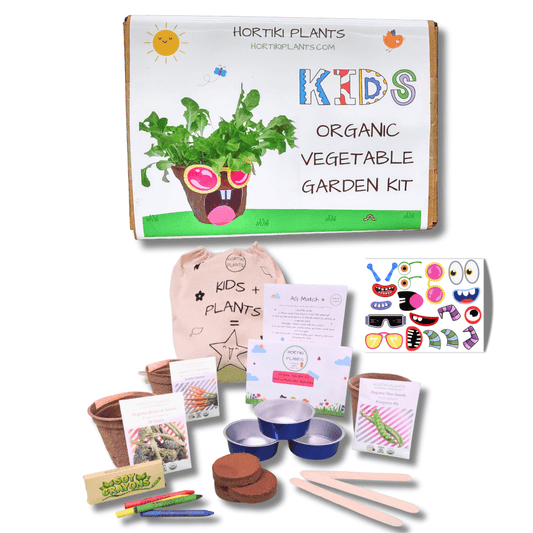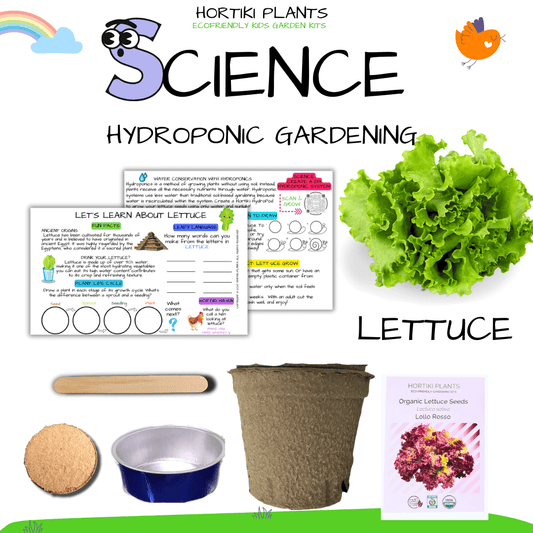May Gardening Fun: Kids, Curiosity & Veggies
Hortiki PlantsMay Garden Fun: Outdoor Activities That Grow Curiosity and Veggies!
Warm Weather, Growing Minds
Spring has officially sprung, and May brings warmer days perfect for outdoor fun! As the days get longer and the flowers begin to bloom, it's the perfect opportunity to encourage kids to unplug, explore nature, and get their hands a little dirty. And what better way to combine fun, education, and sustainability than through gardening?
Gardening is not only a joyful and relaxing activity—it’s also a powerful teaching tool. For children, digging into the soil and watching something grow fosters a sense of responsibility, patience, and pride. It also creates a deeper appreciation for the natural world around them.
This month, we’re sharing how you can turn your backyard, balcony, or schoolyard into a learning lab
Why Gardening is the Perfect May Activity for Kids
Before school lets out for summer, May is an ideal month to begin outdoor educational activities. Here's why gardening makes a great choice:
Hands-on Learning: Kids can physically engage with soil, seeds, and water—great for tactile learners.
Sustainability Education: Teaches kids where food comes from and introduces eco-conscious habits.
Boosts Mental Health: Studies show gardening reduces stress and increases happiness—even in children.
STEM Concepts: Gardening introduces science, technology, engineering, and math in a fun, low-pressure way.
With just a few materials and a bit of sunlight, you can inspire curiosity and nurture future eco-leaders!
Start Simple: Easy-to-Grow Vegetables
One of the best ways to set your child up for gardening success is to start with veggies that are simple to grow and quick to sprout.
Some great beginner options include:
🥬 Lettuce
Grows quickly and is super satisfying to harvest. Many varieties begin sprouting within 7–10 days!
🍅 Pear Tomatoes
These small, sweet tomatoes are not only delicious but also fun to grow. Kids love watching the green fruit turn bright red or yellow, and they’re perfect for snacking straight from the garden.
🥒 Cucumbers
Cucumbers grow fast and spread out, giving kids the joy of discovering hidden fruit beneath the leaves. They're great for garden beds or large containers and offer a fun, crunchy reward.
Connect the Garden to Other Subjects
Gardening is naturally interdisciplinary. Use the garden as a launch pad to explore:
- Math: Measure plant growth, count seeds, track days until sprouting.
- Writing: Keep a garden journal or write a plant’s “life story.” Check out our Kid's Garden Journal!
- Art: Sketch garden scenes or paint garden stones.
- Science: Study pollinators, learn about photosynthesis, and identify bugs.
Creative Activity: Decorate Plant Markers
Make gardening even more exciting by adding an art element! Invite kids to personalize their garden with DIY plant markers.
Materials:
- Craft sticks or old spoons
- Waterproof markers or acrylic paints
- Stickers or small decorations
- Sealer (optional for outdoor gardens)
Let your child label each veggie and add drawings or fun names like “Captain Carrot” or “Sassy Salad.” It’s a great way to boost ownership and creativity!
Nature, Music, and Science: Talk to Your Plants!
Here’s a fun fact that blends science with play: plants can respond to sound! Studies suggest that plants exposed to music or gentle speaking grow faster and healthier than those in silence.
Encourage your kids to:
- Read their favorite book aloud to the garden
- Play calming music while watering
- Sing a “growth song” to their sprouts
This kind of imaginative interaction strengthens emotional intelligence and helps children form a personal connection with nature.
Build a Daily Gardening Routine
Creating a simple daily routine around plant care fosters responsibility and consistency. Consider a “Plant Time” checklist that might include:
- Watering the garden
- Checking soil moisture
- Looking for new sprouts
- Taking garden photos
- Talking or singing to the plants
Try giving each child their own mini garden or task—it boosts confidence and helps them feel proud of their contribution.
Bonus Sustainability Tip: Start a Compost Cup
Want to introduce the concept of recycling and sustainability? Create a mini compost project with your kids:
- Use a clear cup or jar.
- Add layers of soil, fruit scraps, coffee grounds, eggshells, and leaves.
- Seal the top with breathable mesh or plastic wrap with holes.
- Observe how things break down over time.
Talk about how compost feeds the soil and reduces waste. It’s a small, visual way to teach big eco-lessons.
Make It a Family or Group Affair
Gardening is a bonding activity. Whether it’s siblings teaming up, families working side-by-side, or summer camp groups learning together, it creates lasting memories and teamwork skills.
You can even host a “Harvest Party” when your veggies are ready! Serve a salad made from your garden, hand out garden awards (like “Best Decorated Marker”), and celebrate your kids' hard work.
How Hortiki Makes it Easy
At Hortiki Plants, we believe sustainability starts young—and it starts with fun! Our garden kits are:
- 100% eco-friendly
- Perfect for kids ages 6+
- Packaged with easy instructions
- Ideal for homes, classrooms, and camps
Shop our Vegetable Garden Kits and explore all the STEM-friendly options that inspire curiosity, mindfulness, and joy.
Wrap-Up: Grow, Learn, Repeat!
May is just the beginning of a wonderful growing season. With each seed your child plants, they’re learning science, sustainability, and self-confidence. Start simple, keep it fun, and celebrate every sprout.
Let gardening be your child’s springboard into a summer full of learning and discovery—with a little help from the sun, soil, and Hortiki Plants. 🌱





